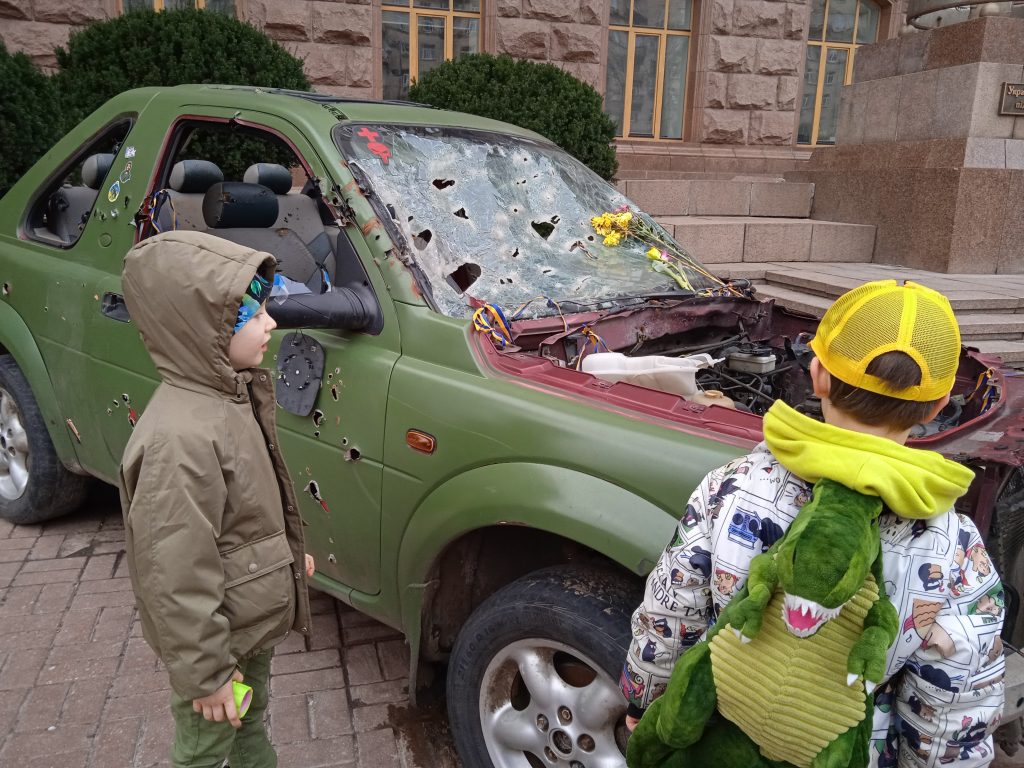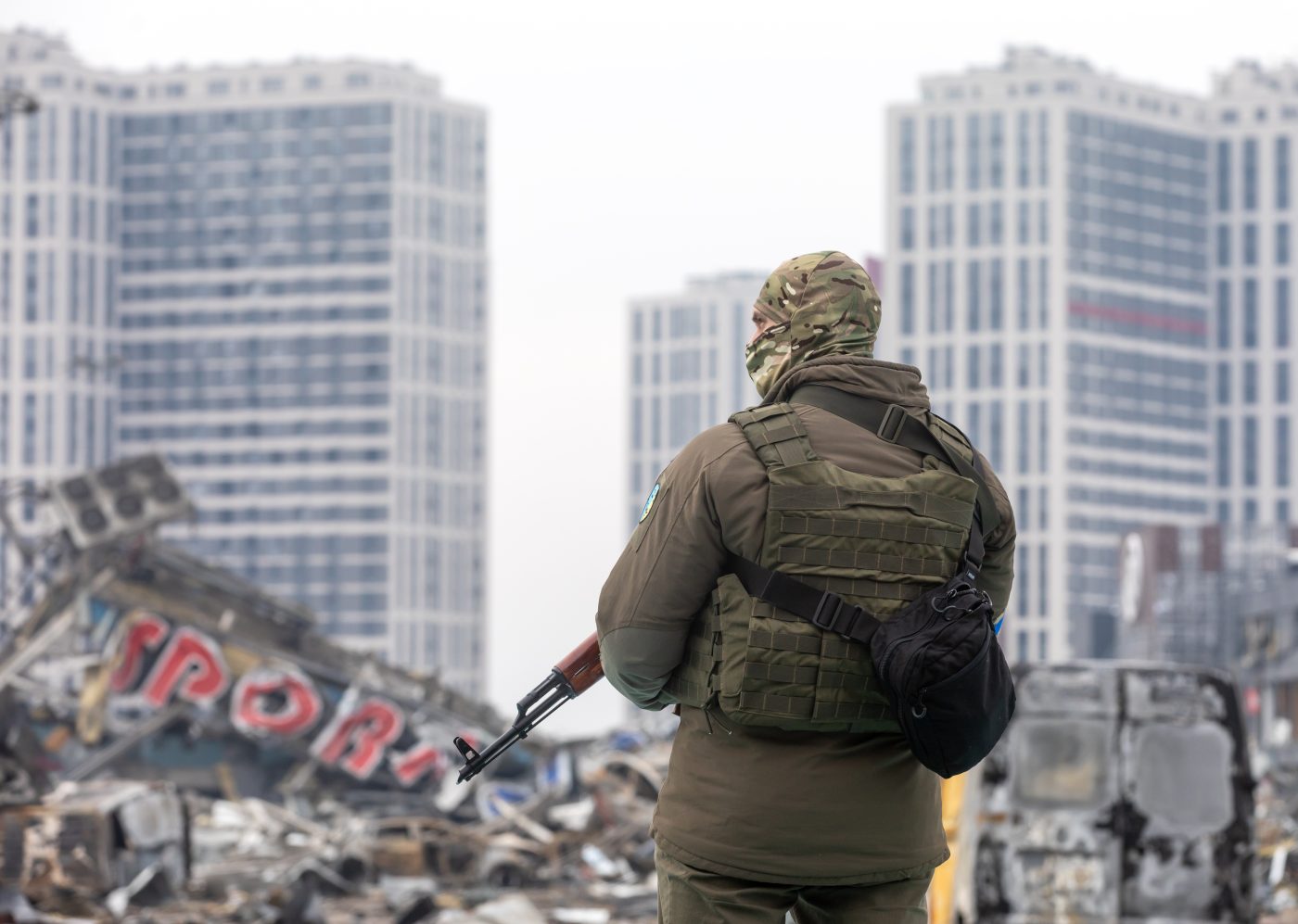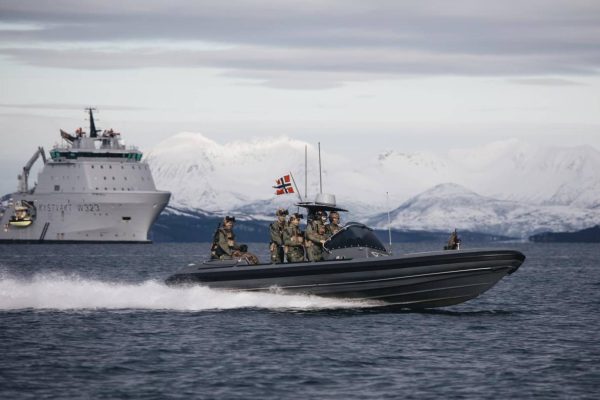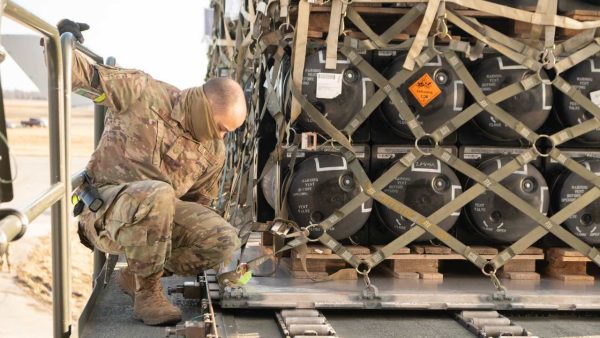A small poster nearby states that the vehicle was used in the war zone by the 3rd Brigade, which now needs “a new horse.”
Yaromyr, who just turned six, takes a 10 hryvnia coin from the pocket of his olive jacket. It turns out to be quite difficult for him to put it in the donation box. The coin falls to the pavement again and again. But he doesn’t give up. He donates all he has and continues his Sunday promenade.
Just 20 minutes later, waiting for lunch in a colorful kid’s cafe, Yaromyr looks out from the huge cafe window and, with a wisdom belying his minimal years and the bunny ears on his head, says: “The war is out there . . . ”


Yaromyr’s father, Igor Slayko, is an artilleryman who first joined the Armed Forces back in 2014. And later, after a short break, went back in 2021. Yar’s mother, Olena Kozachenko, a talented investigative journalist, is now working for the Ukrainian PR Army, a non-profit organization comprising communication experts. This army’s mission, as they describe it themselves, is “to share the truth about the Russian war against Ukraine”.
Today is February 24. This is the day that Ukraine observes the two years since the full-scale Russian invasion began.
But if you say, “two years of war”, many Ukrainians will become understandably irate. The war started 10 years ago, they will say.
When the special police forces shot peaceful protesters in the heart of Kyiv (some of these men later fled to Russia along with their pro-Russian President Viktor Yanukovych; some were arrested, imprisoned, and were later exchanged with Russia as “prisoners of war”.) When the Russian army invaded Crimea. When the fighting, which has never stopped since started in Eastern Ukraine. That was also February, but February 2014.
“Two years ago, my husband made me leave Kyiv. I didn’t want to leave, but on February 24, in the evening, he took me and Yaromyr to the railway station,” Olena says. There were no tickets, but they still hopped on a train to Western Ukraine.
They lived there at friends’ places for almost two months. On April 20, Olena and her son “spontaneously” went back home to Kyiv. They even left most of their things behind.
“My husband was in Kyiv after the liberation of Kyiv region. And we got married — he officially, finally, became my husband,” Olena laughs. “Then he went to liberate Kharkiv region”.
Olena and Yaromyr have stayed in Kyiv ever since.

“Missile attacks. I was very worried when the little one started going to the daycare again. During every air raid, I was on tenterhooks. When the child is with you, it’s calmer. But our air defenses increased, and it became a bit easier to live”, she says.
Still, it’s far from normal. “The future is uncertain. We go on with our lives, we are planning what we can. Yaromyr has to start school in September. I want to do some home improvements, but I don’t know if it makes sense to spend money on repairs now . . . The war seems to me now to be in the worst phase during these two years. They say, Russians can try to take Kyiv again. I don’t know . . .”
As Western aid is delayed, US military aid in particular, Ukraine is outgunned, and it’s natural to worry that the defenses might crack. If the currently effective air defense lacks missiles, there will be no means to “hold the sky” above Ukrainian cities.
Olena understands that. “It will be hard. It will be scary.” She looks at her son: “We will cry . . . “
Lera Burlakova is a Democracy Fellow at the Center for European Policy Analysis (CEPA.) She is a journalist and former soldier from Ukraine. She was an infantrywoman from 2014-2017 after joining the Ukrainian army following the Russian invasion of Crimea. Her war diary “Life P.S.” received the UN Women in Arts award in 2021.
Europe’s Edge is CEPA’s online journal covering critical topics on the foreign policy docket across Europe and North America. All opinions are those of the author and do not necessarily represent the position or views of the institutions they represent or the Center for European Policy Analysis.





